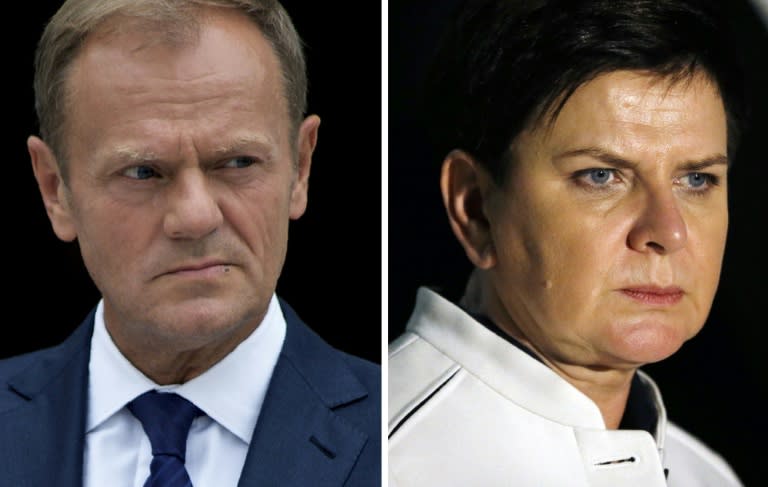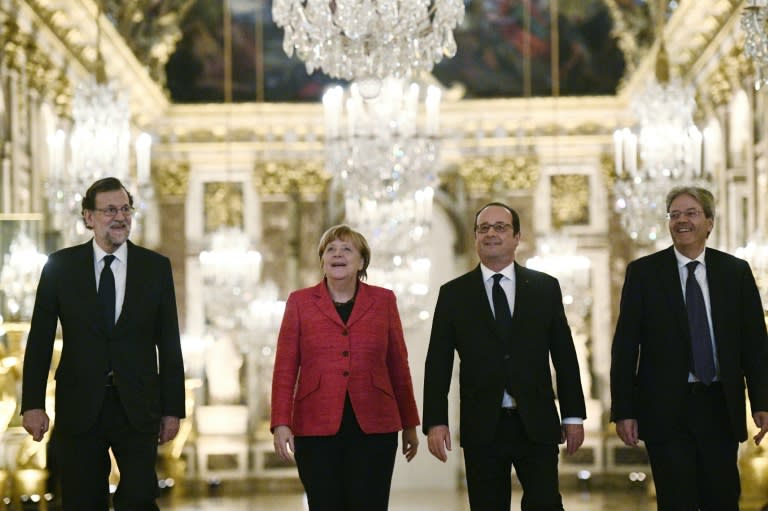Polish fury over re-election of EU's Tusk
EU leaders re-elected Donald Tusk as president Thursday despite opposition from his native Poland, prompting an angry Warsaw to warn that it set a dangerous pattern for bullying by a German-dominated union. The leaders voted by 27 to one at a summit in Brussels to give former Polish premier Tusk a new two-and-a-half-year mandate, with only Poland's current Prime Minister Beata Szydlo voting against. Szydlo, whose right-wing eurosceptic Law and Justice party has nursed a long and bitter enmity with the centrist Tusk, announced that she would block the summit's final communique in revenge. "I won’t accept the summit conclusions, so the summit won’t be valid," a visibly angry Szydlo told a news conference. Insisting that Tusk should not have been elected when his home country opposed it, she said: "This is a very dangerous precedent. "I told my (EU) colleagues that Poland is faced with such a situation, but that soon enough they might find themselves in the same situation." The decision threatens a deep rift with the largest of the eastern post-Soviet EU states, just weeks before the bloc had hoped to make a show of unity at its 60th birthday celebrations in the wake of Britain's vote to leave. "We know that this is now a Union under Berlin's diktat," Poland's Foreign Minister Witold Waszczykowski said after the vote, adding it was a "a very toxic union, that could harm many countries". - Burnt bridges - Szydlo was the only one not to raise her hand during the vote, for which Tusk had to leave the summit room, officials said, adding that he was applauded when he returned. Tusk, Poland's prime minister from 2007 to 2014, later rejected the Polish government's criticisms of a lack of neutrality and said he would try to repair the damage from the row. "Be careful of the bridges you burn because once they are gone you can never cross them again," Tusk said, addressing the Polish government. Tusk thanked the other leaders for their support and vowed that he would "do my best to make the EU better" as it tries to build unity in the wake of last year's Brexit vote. Instead of formal conclusions, Tusk issued a "presidential declaration" backed by the remaining 27 countries without Poland, which covered the economy, defence, and unrest in the Balkans. "I think we achieved a good result on this day though we did not have unanimity," German Chancellor Angela Merkel said. "But we extended the mandate of the Council president, with that we are able to work." Poland, which has repeatedly rowed with Brussels in recent months over political reforms, put forward a surprise rival candidate to Tusk, euro-MP Jacek Saryusz-Wolski, at the weekend. Tusk has been a long-term foe of the head of the Law and Justice party, Jaroslaw Kaczynski, who has accused him of "moral responsibility" for his twin brother's death in a plane crash in Russia in 2010. Tusk however had the overwhelming support not only of Germany but even of Poland's traditional eastern European allies like Hungary which share a similar eurosceptic outlook. - Clouds over Rome - The row threatens to cloud a summit in Rome on March 25th to mark the 60th anniversary of the EU's founding treaty, at which the EU hopes to unveil a declaration of unity in the wake of Brexit. On Friday the 27 EU leaders without Britain's May will look at preparations for the Rome meeting, a ceremonial occasion which will include a meeting with Pope Francis. But that too threatens to highlight the divisions in the EU, already battered by Brexit and the election of an apparently hostile Donald Trump as US president. There is disagreement over whether plans for a major declaration on the bloc's next 10 years, to be made in Rome, should include a mention of plans for a so-called "multi-speed Europe." The leaders of the EU's post-Brexit "big four" -- Germany, France, Italy and Spain -- used a summit in Versailles on Monday to back plans for countries to choose at which speed they integrate on key issues. But eastern countries in particular fear this will lead to a virtual apartheid system where they are left behind on issues like the euro currency, the economy and defence while the major powers push ahead. burs-dk/ar/kb



